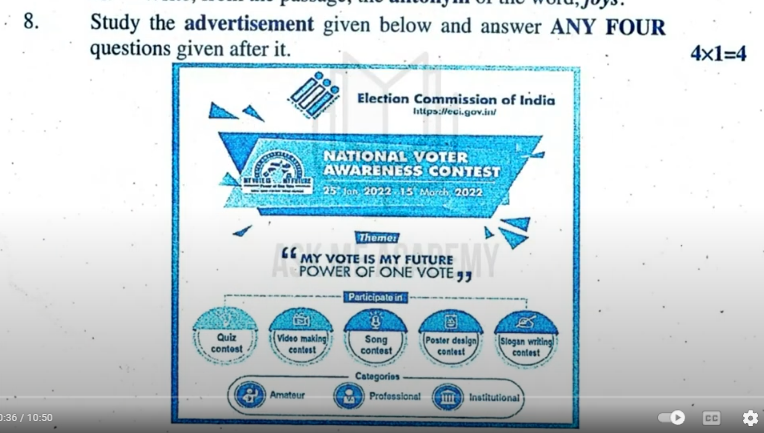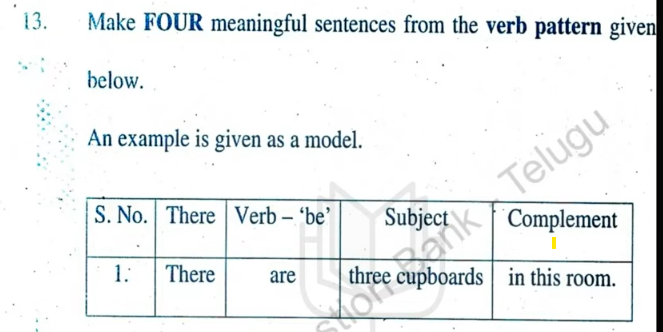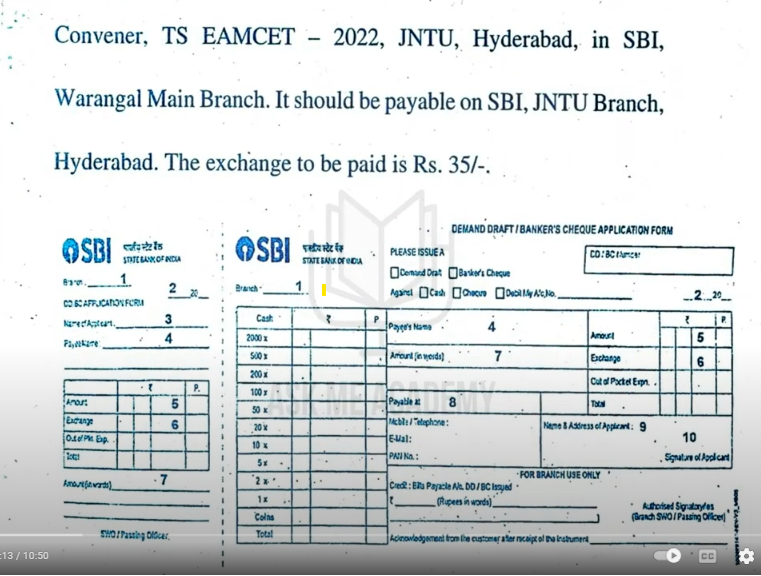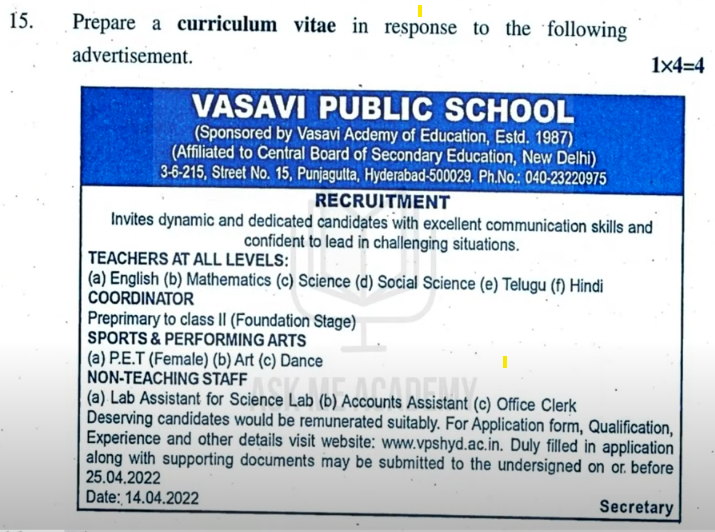TS Inter 2nd Year – English Previous Paper 2023
ENGLISH PAPER -2
TIME: 3 HOURS
MAX.MARKS : 100
1.Question:
Annotate ANY TWO of the following in about 100 words each. (2×4 = 8 marks)
(a) Be very wary of opinions that flatter your self-esteem.
(b) Undoubtedly women in ancient India enjoyed a much higher status than their descendants in the eighteenth and nineteenth
(c) He is a fine, good boy and a hard worker.
Answers:
1. (a) Be very wary of opinions that flatter your self-esteem.
This statement suggests that we should be cautious of opinions that make us feel good about ourselves. Such opinions may not always be genuine or accurate. Flattering opinions can inflate our ego and hinder our growth by preventing us from recognizing our shortcomings and areas for improvement. It’s essential to seek constructive criticism and honest feedback to truly understand our strengths and weaknesses.
2. (b) Undoubtedly women in ancient India enjoyed a much higher status than their descendants in the eighteenth and nineteenth
This statement implies that the social standing of women in ancient India was superior to that of women in later periods, particularly during the 18th and 19th centuries. This could be attributed to various factors, including changes in social norms, economic conditions, and religious beliefs. It’s crucial to remember that generalizations about entire historical periods can be complex and require careful consideration of various perspectives and evidence.
Question 2:
Annotate ANY TWO of the following in about 100 words each. (2×4 = 8 marks)
(a) The poetry of earth is never dead:
This line, likely from a poem, suggests that nature’s beauty and vitality are constant and enduring. Even in the harshest of conditions, life finds a way to persist and express itself. The phrase “poetry of earth” metaphorically represents the inherent beauty and wonder found in nature, from the blooming of flowers to the rustling of leaves. It emphasizes the cyclical nature of life and the continuous renewal that occurs in the natural world.
(b) I ask for nothing for myself / For I am dead for I am dead
These lines convey a sense of profound detachment and resignation. The speaker expresses a lack of desire or need for anything, implying a state of spiritual or emotional emptiness. The repetition of “I am dead” emphasizes the speaker’s feeling of being spiritually or emotionally lifeless. This could be interpreted as a cry for help, a reflection on loss, or a philosophical contemplation on the nature of existence.
Question 3:
Answer ANY TWO of the following questions in about 100 words each. (2×4 = 8 marks)
(a) How can we prevent developing a dogmatic attitude as per Russell’s suggestion?
Bertrand Russell, a renowned philosopher, likely suggested ways to avoid dogmatic thinking, which is characterized by rigid adherence to beliefs without considering alternative viewpoints. To prevent this, one could:
- Embrace critical thinking: Actively question assumptions, analyze evidence, and consider opposing perspectives.
- Cultivate intellectual curiosity: Be open to new ideas and willing to learn and grow.
- Engage in dialogue: Discuss ideas with others, listen to different viewpoints, and be willing to change your mind based on evidence.
- Avoid emotional attachment to beliefs: Recognize that beliefs are subject to change and avoid becoming emotionally invested in them.
(c) To make the spirit of the religion of the forest clear to readers, Tagore presents some sets of contrasts. Explain them.
Rabindranath Tagore, a Nobel Prize-winning poet and philosopher, likely used contrasts to illustrate the core principles of his “religion of the forest.” These contrasts might include:
- Materialism vs. Spirituality: Tagore might contrast the pursuit of material possessions with the importance of spiritual growth and connection with nature.
- Individualism vs. Collectivism: He might emphasize the importance of community and interconnectedness over individual desires and ambitions.
- Greed vs. Generosity: Tagore might highlight the destructive nature of greed and the importance of sharing and compassion.
- Control vs. Harmony: He might contrast the human desire to control nature with the importance of living in harmony with the natural world.
Question 4:
Answer ANY TWO of the following questions in about 100 words each. (2×4 = 8 marks)
(a) How does the speaker describe Miss Pushpa in the poem?
To answer this, we need the context of the poem. Please provide the poem or its title so I can give you a specific and accurate description of Miss Pushpa as portrayed by the speaker.
(b) What is the theme of the poem “On the Grasshopper and Cricket”?
Possible Themes:
- The fleeting nature of life and the importance of enjoying the present moment: The poem, written by John Keats, often focuses on the short lifespan of the grasshopper and cricket, urging readers to appreciate the beauty and brevity of life.
- The connection between nature and human experience: The poem explores the relationship between humans and the natural world, highlighting the simple joys and fleeting beauty found in nature.
- The power of imagination and the ability to find joy in simple things: The poem celebrates the ability to find wonder and beauty in the everyday, even in the small things like a grasshopper’s song.
(c) How can one overcome fear? Explain.
Overcoming fear is a complex process that can involve various strategies:
- Identify and Understand Your Fears: Recognizing the source of your fear is the first step. Is it a specific situation, object, or thought? Understanding the nature of your fear can help you address it more effectively.
- Challenge Your Fears: Question the validity of your fears. Are they based on real threats or are they exaggerated or imagined? Confronting your fears in a controlled and gradual manner can help you realize that they are often less daunting than you perceive them to be.
- Develop Coping Mechanisms: Relaxation techniques like deep breathing, meditation, or mindfulness can help manage anxiety and fear. Exercise and healthy lifestyle choices can also contribute to reducing stress and increasing resilience.
- Seek Support: Talking to friends, family, or a therapist can provide valuable insights and support. Sharing your fears with others can help you feel less alone and develop strategies for overcoming them.
- Focus on Your Strengths: Remind yourself of your past successes and accomplishments. Recognizing your resilience and ability to overcome challenges can boost your confidence and help you face your fears with greater courage.
Question 5:
Answer ANY TWO of the following questions in about 100 words each. (2×4 = 8 marks)
(a) What made Arun call the strange women ‘mother’ at the end?
To answer this, we need the context of the story. Please provide the title of the story or a brief summary so I can give you a specific and accurate answer.
(b) “Love, sacrifice and generosity are the essential elements for happy living.” Explain this statement with reference to the story “A Gift for Christmas.”
To answer this, we need the context of the story. Please provide the title of the story or a brief summary so I can explain the statement with reference to the story’s plot and characters.
(c) What was the Baron’s wish? Was it fulfilled? Explain.
To answer this, we need the context of the story. Please provide the title of the story or a brief summary so I can give you a specific and accurate answer.
SECTION -B
6.Read the passage carefully and answer any four question
Passage:
In his busy round of work, Dr. Raman had not noticed that Gopal had not called in for over three months now. He just remembered it when he saw Gopal’s son sitting on a bench in the consulting hall, one crowded morning. Dr. Raman could not talk to him for over an hour. When he got up and was about to pass on to the operation room, he called
the youth was nervous and shy. “What brings you here, sir?” The youth was nervous and shy. “Mother sent me here.” “What can I do for you?” “Father is ill……”
Questions:
i. What was that Dr. Raman had not noticed?
ii. How did Dr. Raman remember what he had not noticed earlier?
iii. What kind of young man was Gopal’s son?
iv. What was the problem that made Gopal’s son visit Dr. Raman?
v. Write the phrase from the passage that shows Dr. Raman was always busy.
vi. Write the part of speech of the word ’round’ in “……busy round of work……”
Answers:
i. Dr. Raman had not noticed that Gopal had not called in for over three months.
ii. Dr. Raman remembered it when he saw Gopal’s son sitting in the consulting hall.
iii. Gopal’s son was nervous and shy.
iv. Gopal’s father was ill.
v. “busy round of work”
vi. Noun (In this context, “round” refers to a “routine” or “series” of tasks)
Pencil Preaches
Pencil seems to be little but teaches SIX great lessons of life. Surprising? See how?
(i) The pencil suffers a little when we use a sharpener but afterwards, it is much sharper. So, let’s learn to bear certain pains and sorrows because they will make us better persons.
(ii) It allows us to use an eraser to rub out mistakes. This means correcting something we did is not necessarily a bad thing; it helps us to keep on the right path.
(iii) What really matters in it is not its wooden exterior, but the graphite inside. So, let’s always pay attention to what is happening inside us.
(iv) It always leaves a mark. In just the same way, everything we do in life will leave a mark. So, let’s try to be conscious of that in every action of ours.
(v) It gets shorter and shorter with use. So does life. Let’s make the most of it while it lasts.
(vi) It writes till the end. Let’s try to be useful and productive till the end.
Answers to Questions:
-
What is the result of bearing pains and sorrows?
Answer: They will make us better persons. -
-
Is correcting something we did a bad thing?
Answer: No, correcting something we did is not necessarily a bad thing; it helps us to keep on the right path. -
What matters most in a pencil?
Answer: What matters most in a pencil is the graphite inside. -
Why should we be conscious of every action of ours?
Answer: We should be conscious of every action of ours because everything we do in life will leave a mark. -
Find the word from the passage that means “outer.”
Answer: The word is “exterior.” -
Write, from the passage, the antonym of the word “joys.”
Answer: The antonym of “joys” in the passage is “pains.”
-

Here are the answers to the questions based on the advertisement you provided:
i. What is the theme of NVAC?
Answer: The theme of the NVAC is “My Vote is My Future – Power of One Vote.”
ii. Name any two areas in which the contest takes place.
Answer: The advertisement mentions several areas where the contest takes place, including: – Quiz Contest – Video Making Contest – Song Contest – Poster Design Contest – Slogan Writing Contest
So, you can choose any two from this list.
iii. Who has issued this advertisement?
Answer: The Election Commission of India has issued this advertisement.
iv. Write the antonym, from the advertisement, of the word amateur.
Answer: The antonym of “amateur” from the advertisement is “professional.”
v. When is the contest scheduled?
Answer: The contest is scheduled from 25th Jan 2022 to 15th March 2022.
vi. Pick the synonym of the word consciousness from the passage.
Answer: The synonym of the word “consciousness” from the passage is “awareness.”

Questions:
-
How many main branches of literature are given in the diagram?
- Answer: There are four main branches of literature shown in the diagram: Poetry, Drama, Novel, and Short Stories.
-
In which branch of literature can one find imaginative aspects?
- Answer: The Poetry branch is explicitly labeled as “Imaginative.”
-
Name any one class of drama.
- Answer: The diagram shows two classes of drama: Comedy and Tragedy.
-
Which branch of literature stands close to life?
- Answer: The Novel branch is indicated as standing “close to life.”
-
Mention the number of classes novels are divided into here.
- Answer: The diagram doesn’t explicitly show a division of novels into classes.
-
Historical approach can be seen in novels. Write true or false.
- Answer: True. The diagram shows “Historical” as a sub-branch under the Novel branch.
10. Rewrite the following passage/sentences using EIGHT punctuation marks wherever necessary.
Original:
When i was young. I lived much outside my own country in France Germany Italy and the United States.
Punctuated Version:
When I was young, I lived much outside my own country in France, Germany, Italy, and the United States.
Explanation:
- We added a comma after “young” to separate the main clause from the subordinate clause.
- We added commas to separate the countries listed in the series.
11. Match ANY FOUR of the following words in Column ‘A’ with their meanings/definitions in Column ‘B’.
| Column A | Column B |
|---|---|
| i. optimist | d. one who looks at the bright side of things |
| ii. biography | a. a story of someone’s life written by another person |
| iii. contemporary | e. living or occurring at the same time |
| iv. etymology | f. the study of the origin and history of words |
| v. notorious | b. well known for some bad quality |
| vi. teetotaller | c. one who never takes alcoholic drinks |
Explanation:
- Contemporary: Living or occurring at the same time.
- Etymology: The study of the origin and history of words.
- Notorious: Well-known for some bad quality or deed.
- Teetotaller: A person who abstains completely from alcoholic drinks.
Question:
12. Fill in ANY FOUR blanks in the following sentences with suitable idiomatic expressions given below. Make necessary changes in the idioms if needed.
Idiomatic Expressions:
- Once in a blue moon
- Bolt from the blue
- A drop in the ocean
- Storm in a tea cup
- Rags to riches
- Risk life and limb
Sentences:
- Don’t __________________ by participating in reality shows.
- He attends classes __________________.
- The small donation was just __________________.
- The results of the recent polls were __________________ to many parties.
- Dhirubhai Ambani’s life is a story of __________________.
- There was a __________________ over who should be the Chief Guest on Hostel Day.
Answers:
- Don’t risk life and limb by participating in reality shows.
- He attends classes once in a blue moon.
- The small donation was just a drop in the ocean.
- The results of the recent polls were a bolt from the blue to many parties.
- Dhirubhai Ambani’s life is a story of rags to riches.
- There was a storm in a tea cup over who should be the Chief Guest on Hostel Day.

Certainly! Here are four meaningful sentences using the exact verb pattern provided:
- There is a book on the table.
- There are many stars in the sky.
- There was a loud noise outside.
- There will be a party next week.
These sentences follow the structure:
There + Verb ‘be’ + Subject + Complement



Certainly, let’s create a CV that precisely matches the requirements of the Vasavi Public School job advertisement.
[Your Name] [Your Address] [Your Phone Number] [Your Email Address]
Summary
Highly motivated and results-oriented [Your Degree/Diploma] with [Number] years of experience as a [Your Current Job Title] in a fast-paced educational environment. Proven ability to create engaging learning experiences, foster a positive classroom atmosphere, and effectively communicate with students, parents, and colleagues. Seeking a challenging position as a [Specific Job Title you are applying for at Vasavi Public School] to contribute my skills and passion for education.
Education
- [Degree Name], [Major] (e.g., B.Ed., M.Sc. Physics), [University Name], [Year of Graduation]
- Relevant coursework: [List relevant courses, e.g., Educational Psychology, Child Development, [Specific Subjects like Physics, Chemistry, etc. if applicable]]
- GPA: [Your GPA] (optional)
- [Any other relevant degrees or certifications, e.g., Diploma in Early Childhood Education, relevant professional certifications]
Experience
- [Job Title], [School Name], [City, State] ([Dates of Employment])
- [List key responsibilities and accomplishments. Use action verbs and quantify your achievements whenever possible.
- Example: “Developed and implemented engaging lesson plans aligned with the CBSE curriculum.”
- Example: “Successfully managed a class of 30 students, improving their average test scores by 15%.”
- Example: “Collaborated with parents to create a positive learning environment for students.”]
- [List key responsibilities and accomplishments. Use action verbs and quantify your achievements whenever possible.
- [Previous Job Title (if applicable)], [School Name], [City, State] ([Dates of Employment])
- [List key responsibilities and accomplishments as above]
Skills
- Teaching Skills: Classroom management, differentiated instruction, assessment design, lesson planning, curriculum development, communication, collaboration, active listening, patience, empathy.
- Technical Skills: [List relevant software, e.g., Microsoft Office Suite, Google Classroom, educational software, any specific software used in your field (e.g., LabVIEW for Science teachers)]
- Other Skills: [List any other relevant skills, e.g., creative problem-solving, organization, time management, communication (written and verbal), public speaking, teamwork, leadership]
Extracurricular Activities and Interests
- [List any relevant extracurricular activities or interests, e.g., coaching sports teams, volunteering in educational settings, involvement in educational organizations, any relevant hobbies]
References
- [Name of Reference], [Title], [Organization], [Contact Information]
- [Name of Reference], [Title], [Organization], [Contact Information]
Key Points to Remember:
- Tailor this CV to the specific job you are applying for. If you are applying for a teaching position, emphasize your teaching skills and experience. If you are applying for a sports coach role, highlight your coaching experience and relevant sports skills.
- Use keywords from the job description. Incorporate relevant keywords from the advertisement throughout your CV to improve your chances of getting noticed by the applicant tracking system (ATS).
- Quantify your achievements whenever possible. Use numbers and data to demonstrate your impact and accomplishments in previous roles.
- Proofread carefully for any errors in grammar or spelling. Ensure your CV is professional and error-free.
Question 16:
Option 1: Describe about your mother using the hints given below.
My mother is a remarkable woman who is the cornerstone of our family. She is tall and thin with beautiful black hair. She plays an incredibly important role in my life and is a true inspiration.
Every morning, she wakes up at 5 AM to prepare breakfast and get us ready for school. She ensures that we have everything we need for the day, from packed lunches to our school bags. Besides taking care of us, she also lovingly tends to my father, grandparents, and other family members.
Despite juggling numerous responsibilities, she never complains. She always maintains a positive attitude and faces challenges with unwavering strength. I admire her resilience and emotional fortitude.
My mother is a symbol of love, sacrifice, and unwavering support. I aspire to be like her, kind, compassionate, and always there for my loved ones.
Option 2: Describe how to prepare a potato fry.
Ingredients:
- Potatoes
- Oil
- Turmeric powder
- Chilli powder
- Salt
Equipment:
- Heavy-bottomed pan
Process:
- Preparation: Wash and peel the potatoes. Cut them into thin, even slices or French fries.
- Soaking: Soak the potato slices in water for about 15-20 minutes to remove excess starch. This helps prevent them from sticking together while frying.
- Drying: Drain the potatoes and pat them dry with a clean cloth.
- Marination: In a bowl, combine the turmeric powder, chilli powder, and salt. Add the potato slices and mix well to coat them evenly.
- Frying: Heat the oil in the heavy-bottomed pan over medium heat. Once the oil is hot, carefully add the potato slices in batches. Fry them until golden brown and crispy.
- Draining: Remove the fried potatoes from the pan using a slotted spoon and place them on a paper towel to absorb excess oil.
- Serving: Serve the potato fries hot with ketchup, mayonnaise, or any other desired dipping sauce.
Question 17:
Option 1: Write a letter to your uncle requesting him to assist you in conducting a blood donation camp.
[Your Name] [Your Address] [Date]
[Uncle’s Name] [Uncle’s Address]
Dear Uncle,
I am writing to request your kind assistance in conducting a blood donation camp on behalf of the Red Cross Society. The camp is scheduled to be held on [Date] at [Venue] from [Time] to [Time].
Your expertise and experience in organizing community events would be invaluable to us. We would greatly appreciate your help in the following areas:
- Mobilizing volunteers: Assisting us in recruiting volunteers to help with registration, refreshments, and other logistical aspects of the camp.
- Publicity and awareness: Spreading the word about the camp through your network and social media channels.
- Donor recruitment: Encouraging your friends, family, and colleagues to participate in the blood donation drive.
Your support would be instrumental in making this blood donation camp a success. We look forward to your positive response and eagerly anticipate your valuable contribution.
Thank you for your time and consideration.
Sincerely, [Your Signature] [Your Typed Name] President, [Name of Voluntary Organization]
Option 2: Write a letter to your Manager requesting him to grant you five days of casual leave.
[Your Name] [Your Address] [Date]
[Manager’s Name] [Manager’s Designation] [Company Name] [Company Address]
Dear [Manager’s Name],
This letter is to request a casual leave of five days, from [Start Date] to [End Date].
[ Briefly state the reason for leave, if any. For example: I am planning a short vacation with my family. / I need to attend to some personal commitments.]
I will ensure that all my urgent tasks are completed before my leave and will make arrangements for my work to be covered during my absence.
Thank you for your understanding and consideration.
Sincerely, [Your Signature] [Your Typed Name] [Your Employee ID]
Question 19:
Mark the stress for ANY EIGHT of the following words.
Answers:
i. ‘symbolize ii. ‘logic iii. ‘famous iv. de’gree v. ‘station vi. am’bitious vii. con’tainer viii. gram’matical ix. ‘political x. cho’reography
Question 20:
Option 1: Write a Dialogue between a father and son who wants to know his son’s plan for the future.
Father: So, son, what are your plans for the future? What do you want to do after you finish school?
Son: Well, dad, I’ve been thinking about it a lot. I’m really interested in [Mention a field of interest, e.g., engineering, medicine, arts, etc.]. I’ve been reading about [Mention a specific university or institution] and I think I’d like to study there.
Father: That sounds like a great goal! What are you going to do to prepare for your chosen field?
Son: I’m going to focus on my studies, especially in [Mention relevant subjects, e.g., science, mathematics, etc.]. I’m also planning to participate in [Mention relevant extracurricular activities, e.g., science clubs, internships, etc.] to gain some practical experience.
Father: That’s a very good plan. I’m proud of you for thinking ahead and setting goals for your future. I will support you in any way I can.
Son: Thank you, dad. I appreciate your encouragement.
Option 2: Write a Dialogue between a teacher and a student who was absent to class.
Teacher: Good morning, [Student Name]. Why were you absent from class yesterday?
Student: Good morning, ma’am. I was unwell yesterday and had to stay home.
Teacher: I hope you are feeling better now. What lessons did you miss yesterday?
Student: We learned about [Mention the topics covered in class, e.g., verb tenses, a new chapter in history, etc.].
Teacher: No problem. You can borrow notes from a classmate or come to me during recess and I can explain the concepts to you.
Student: Thank you, ma’am. I will do that.
Teacher: Take care and get well soon.
Student: Thank you, ma’am.
